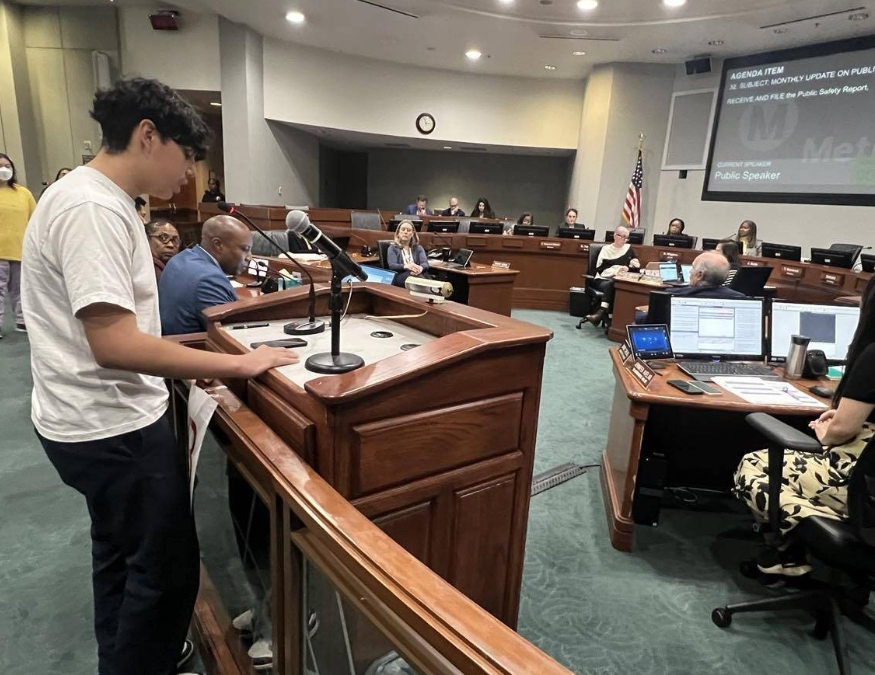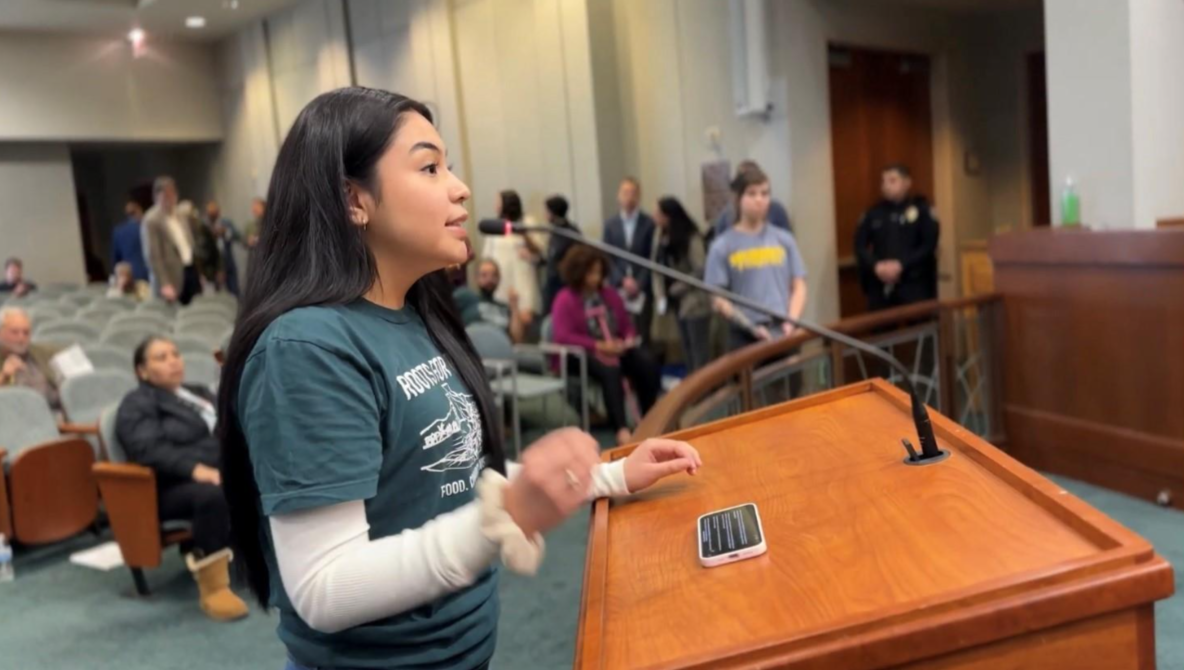
Jason, an AFSC youth participant, speaks at a Metro committee meeting on public safety. Photo: Adalberto Rios/AFSC
Everyone deserves access to safe and affordable public transportation. But too often, transit agencies prioritize policing in their budgets. That results in more harassment for riders – especially working-class people of color – without creating real safety.
That’s starting to change in Los Angeles thanks to years of advocacy by ACTLA, a broad coalition of 50 organizations, including AFSC. Three years ago, youth with AFSC’s Roots For Peace Program joined efforts to advocate for fareless transit and unarmed ambassadors on trains and buses.
After starting as a pilot program with contracted workers in 2022, the Green Shirt Ambassadors are now in-house, unionized staff. That means they’re permanent employees able to secure union contracts.
Officially, these ambassadors are there to help riders—providing information on how to get around, pay fares, and support unhoused individuals with accessing resources. Unofficially, they help to de-escalate situations and have even saved 334 lives by administering Narcan to riders experiencing overdoses.
After learning about organizing at AFSC Freedom Schools, youth participants took part in public hearings held by the LA Metro Board and other city committees. They decried billion-dollar contracts with police departments and instead called for real public safety.

Cindy Alonso, an intern with LA Roots For Peace, addresses an LA Metro board meeting. Photo: Adalberto Rios/AFSC
Cindy, 17, said before the Metro board, “As a Mexican woman, who has lived in the low-income community of South Central, ... I’ve bared witness to the continuous cycle of systemic harm that policing produces on Black and Brown communities. ... Instead of Metro replicating historic systems of harm, we as the community would much rather Metro use OUR tax dollars to fund things that DO make us feel safe. Fund the transit ambassadors, fund mental health outreach workers, and FUND FARELESS! We need buses, not balazos (gunshots)!”
“AFSC youth and staff have brought strategic prowess to this advocacy work,” says AFSC’s Adalberto Rios. While he believes working-class riders and vendors deserve the bulk of the credit for this recent win for the ambassadors, young people also made a difference. “The impact of young people having a very clear stance and lens around transit ambassadors has been very impactful for some Board members,” he says.
Building on this win
While Roots For Peace welcomes this news, there are still several steps needed to reach true public safety beyond policing. And AFSC is committed to support young people and all community members in continuing to organize for these changes.
Advocates want more transit ambassadors and bathroom attendants in order to increase the number of people around Metro stations and stops. Having well-lit transit hubs with plenty of staff, attendants, and vendors reduces the potential for harm. Foot traffic, rather than police, promote real safety.
While the current level of Green Shirt Ambassadors is a good start, advocates ask, why not double, triple or quadruple their number? Having an unarmed transit helper on every train and bus in LA would result in even more lives saved – and greater safety for all riders and vendors who work at local stations. Diverting even 10% of Metro’s police budget toward the Green Shirt Ambassadors would double the number of transit ambassadors.
During the COVID-19 pandemic, transit in LA was fareless. AFSC is working alongside other advocates to bring fareless transit back. Working-class people already pay taxes that fund public transportation and should not have to pay again to use it, Adalberto says. In addition, Metro wastes millions of dollars to enforce fareboxes and turnstile compliance that they actively lose money on.
Critics argue that fareless transit would promote more crime, and yet Metro officials refuse to back up that claim with statistics. Instead, over the last five years Metro has spent $1 billion on ineffective police contracts. Adalberto asks, “Why are we still paying for police when we could be investing in all these other alternatives that would make people feel safer and provide a better ridership experience?”
Billboards call for a new direction for community safety
To help the public understand that there are better alternatives to policing, AFSC is launching a billboard campaign in LA. The first billboard reminds people that transit ambassadors help people and save hundreds of lives in ways that police can’t.
The second billboard says that community needs care, not cages. We need to fund programs that help people rather than prisons. “This billboard is trying to help people make the connections between militarism and all its levels,” Adalberto says. “The so-called ‘Big Beautiful Bill’ is gutting the services and instead is funding cages, detentions, and deportations. We want people to start making those connections.”
On youth making a difference
AFSC is supporting young people to claim their seat at the table as serious contributors to public policy decisions.
“Youth are showing that they’re capable of sharing their thoughts and desires – and they’re being taken seriously,” Adalberto says. “We have helped bring that to the forefront as it relates to this work and our coalition – showing how punitive practices and funding for policing impact young people here in LA.”
